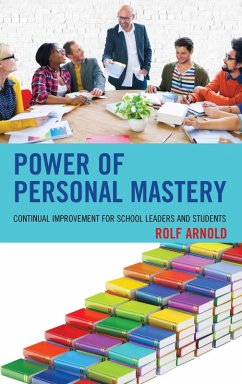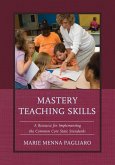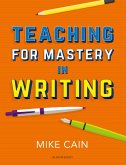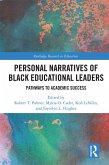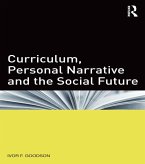Rolf Arnold
Power of Personal Mastery (eBook, ePUB)
Continual Improvement for School Leaders and Students
29,95 €
inkl. MwSt.
Sofort per Download lieferbar

15 °P sammeln
Rolf Arnold
Power of Personal Mastery (eBook, ePUB)
Continual Improvement for School Leaders and Students
- Format: ePub
- Merkliste
- Auf die Merkliste
- Bewerten Bewerten
- Teilen
- Produkt teilen
- Produkterinnerung
- Produkterinnerung

Bitte loggen Sie sich zunächst in Ihr Kundenkonto ein oder registrieren Sie sich bei
bücher.de, um das eBook-Abo tolino select nutzen zu können.
Hier können Sie sich einloggen
Hier können Sie sich einloggen
Sie sind bereits eingeloggt. Klicken Sie auf 2. tolino select Abo, um fortzufahren.

Bitte loggen Sie sich zunächst in Ihr Kundenkonto ein oder registrieren Sie sich bei bücher.de, um das eBook-Abo tolino select nutzen zu können.
This is a book about personal mastery for school leaders and their students. It references an ongoing concern about reflection in learning, education, and human development. Innumerable ideas and concepts about this have been advanced in the past; most claim more than they can deliver. The notes and reflections on personal mastery presented here are not intended to be yet another version of such traditional treatments. Rather, this book looks at personal mastery from a new perspective and considers it as the result of self-empowered education and practice.
- Geräte: eReader
- mit Kopierschutz
- eBook Hilfe
- Größe: 3.82MB
Andere Kunden interessierten sich auch für
![Leading with Resolve and Mastery (eBook, ePUB) Leading with Resolve and Mastery (eBook, ePUB)]() Robert K. WilhiteLeading with Resolve and Mastery (eBook, ePUB)26,95 €
Robert K. WilhiteLeading with Resolve and Mastery (eBook, ePUB)26,95 €![Teachers, Mindset, Motivation, and Mastery (eBook, ePUB) Teachers, Mindset, Motivation, and Mastery (eBook, ePUB)]() Amy K. ConleyTeachers, Mindset, Motivation, and Mastery (eBook, ePUB)22,95 €
Amy K. ConleyTeachers, Mindset, Motivation, and Mastery (eBook, ePUB)22,95 €![Mastery Teaching Skills (eBook, ePUB) Mastery Teaching Skills (eBook, ePUB)]() Marie Menna PagliaroMastery Teaching Skills (eBook, ePUB)23,95 €
Marie Menna PagliaroMastery Teaching Skills (eBook, ePUB)23,95 €![Teaching for Mastery in Writing (eBook, ePUB) Teaching for Mastery in Writing (eBook, ePUB)]() Mike CainTeaching for Mastery in Writing (eBook, ePUB)12,95 €
Mike CainTeaching for Mastery in Writing (eBook, ePUB)12,95 €![Personal Narratives of Black Educational Leaders (eBook, ePUB) Personal Narratives of Black Educational Leaders (eBook, ePUB)]() Robert T. PalmerPersonal Narratives of Black Educational Leaders (eBook, ePUB)41,95 €
Robert T. PalmerPersonal Narratives of Black Educational Leaders (eBook, ePUB)41,95 €![Curriculum, Personal Narrative and the Social Future (eBook, ePUB) Curriculum, Personal Narrative and the Social Future (eBook, ePUB)]() Ivor F. GoodsonCurriculum, Personal Narrative and the Social Future (eBook, ePUB)33,95 €
Ivor F. GoodsonCurriculum, Personal Narrative and the Social Future (eBook, ePUB)33,95 €![Job One 2.0 (eBook, ePUB) Job One 2.0 (eBook, ePUB)]() Job One 2.0 (eBook, ePUB)29,95 €
Job One 2.0 (eBook, ePUB)29,95 €-
-
-
This is a book about personal mastery for school leaders and their students. It references an ongoing concern about reflection in learning, education, and human development. Innumerable ideas and concepts about this have been advanced in the past; most claim more than they can deliver. The notes and reflections on personal mastery presented here are not intended to be yet another version of such traditional treatments. Rather, this book looks at personal mastery from a new perspective and considers it as the result of self-empowered education and practice.
Produktdetails
- Produktdetails
- Verlag: Bloomsbury eBooks US
- Seitenzahl: 220
- Erscheinungstermin: 10. Juli 2017
- Englisch
- ISBN-13: 9781475836882
- Artikelnr.: 48804773
- Verlag: Bloomsbury eBooks US
- Seitenzahl: 220
- Erscheinungstermin: 10. Juli 2017
- Englisch
- ISBN-13: 9781475836882
- Artikelnr.: 48804773
- Herstellerkennzeichnung Die Herstellerinformationen sind derzeit nicht verfügbar.
Rolf Arnold, PhD, obtained his doctorate at the University of Heidelberg, Germany, in 1983 and his postdoctoral qualification at the Distance University of Hagen, Germany, in 1987. In 2017, he received an honorary doctorate (Dr. h.c) from the West University of Timi?oara, Romania. Since 1990, he has been Professor of Pedagogy (Vocational and Adult Education) at Technische Universität Kaiserslautern, Germany. He is also Scientific Director of the Distance and Independent Studies Centre (DISC), Kaiserslautern, Germany, and speaker of the Virtual Campus Rhineland-Palatinate (VCRP).
Preface
Introduction
Rule 1: Teach yourself and your students to accept biographies for what
they are - a story from the past. Learn to use your biography without
constantly quoting from it!
Rule 2: Linger not (only) on what is: instead, direct your attention to
what has not been allowed to be, but could be!
Rule 3: Do not grieve over what is past, but participate in what is still
possible!
Rule 4: Learn to examine personal values by comparing them to others!
Rule 5: Learn to share deeper thoughts, not exclusive rote learning!
Rule 6: Learn to plan life from how you want it to end!
Rule 7: Train to see situations through different eyes and avoid expected
judgments!
Rule 8: Learn to see potential in others, not for confirmation of your own
experience and fears!
Rule 9: Work on improving your powers of observation and the elegance of
how you are perceived!
Rule 10: Be open to what at first may seem unimaginable, but what in fact
is already transforming your everyday life and work.
Rule 11: Cultivate reference points for safe, correct, and proper actions
in your daily routine and professional life.
Rule 12: Serve the interests of the major concerns of civilization!
Rule 13: Get to know your emotion sensor and gain control in difficult
situations!
Rule 14: Understand the state of your and your students' personality
development.
Rule 15: Practice planning and developing emotional competence in
relationships!
Rule 16: Play "Parcheesi plus" for self-discovery and exercising
alternative ego states!
Rule 17: Document the history of emotional self-examination in a portfolio
of emotions!
Rule 18: Reinforce emotional competence through practice exercises!
Rule 19: Practice the art of real meta communication!
Rule 20: Cultivate a winning attitude of learning "from others"!
Rule 21: Heal yourself and your students through closeness and an
appreciative non-response to suffering!
Rule 22: Build an inner "look-out" for the early detection of emotional
shoals, currents, and whirlpools.
Rule 23: Find your students among the great thinkers of centuries past and
maintain a dialogue with this external team!
Rule 24: Train for the championship in successful dealings with others!
Rule 25: Create occasions for supervision and feedback and routinely use
what you learn!
Rule 26: Practice deliberate re-interpretation and re-sensing!
Rule 27: Uncover and interprete cognitive-emotional programs for
self-examination and self-transformation!
Rule 28: Be responsible for the self-development of yourself and your
students (motto: "Become who you could be!")
Rule 29: Mistrust the 28 rules and manage without them!
Conclusion: The Munchausen Syndrome: I will be who I can be!
Bibliography
Introduction
Rule 1: Teach yourself and your students to accept biographies for what
they are - a story from the past. Learn to use your biography without
constantly quoting from it!
Rule 2: Linger not (only) on what is: instead, direct your attention to
what has not been allowed to be, but could be!
Rule 3: Do not grieve over what is past, but participate in what is still
possible!
Rule 4: Learn to examine personal values by comparing them to others!
Rule 5: Learn to share deeper thoughts, not exclusive rote learning!
Rule 6: Learn to plan life from how you want it to end!
Rule 7: Train to see situations through different eyes and avoid expected
judgments!
Rule 8: Learn to see potential in others, not for confirmation of your own
experience and fears!
Rule 9: Work on improving your powers of observation and the elegance of
how you are perceived!
Rule 10: Be open to what at first may seem unimaginable, but what in fact
is already transforming your everyday life and work.
Rule 11: Cultivate reference points for safe, correct, and proper actions
in your daily routine and professional life.
Rule 12: Serve the interests of the major concerns of civilization!
Rule 13: Get to know your emotion sensor and gain control in difficult
situations!
Rule 14: Understand the state of your and your students' personality
development.
Rule 15: Practice planning and developing emotional competence in
relationships!
Rule 16: Play "Parcheesi plus" for self-discovery and exercising
alternative ego states!
Rule 17: Document the history of emotional self-examination in a portfolio
of emotions!
Rule 18: Reinforce emotional competence through practice exercises!
Rule 19: Practice the art of real meta communication!
Rule 20: Cultivate a winning attitude of learning "from others"!
Rule 21: Heal yourself and your students through closeness and an
appreciative non-response to suffering!
Rule 22: Build an inner "look-out" for the early detection of emotional
shoals, currents, and whirlpools.
Rule 23: Find your students among the great thinkers of centuries past and
maintain a dialogue with this external team!
Rule 24: Train for the championship in successful dealings with others!
Rule 25: Create occasions for supervision and feedback and routinely use
what you learn!
Rule 26: Practice deliberate re-interpretation and re-sensing!
Rule 27: Uncover and interprete cognitive-emotional programs for
self-examination and self-transformation!
Rule 28: Be responsible for the self-development of yourself and your
students (motto: "Become who you could be!")
Rule 29: Mistrust the 28 rules and manage without them!
Conclusion: The Munchausen Syndrome: I will be who I can be!
Bibliography
Preface
Introduction
Rule 1: Teach yourself and your students to accept biographies for what
they are - a story from the past. Learn to use your biography without
constantly quoting from it!
Rule 2: Linger not (only) on what is: instead, direct your attention to
what has not been allowed to be, but could be!
Rule 3: Do not grieve over what is past, but participate in what is still
possible!
Rule 4: Learn to examine personal values by comparing them to others!
Rule 5: Learn to share deeper thoughts, not exclusive rote learning!
Rule 6: Learn to plan life from how you want it to end!
Rule 7: Train to see situations through different eyes and avoid expected
judgments!
Rule 8: Learn to see potential in others, not for confirmation of your own
experience and fears!
Rule 9: Work on improving your powers of observation and the elegance of
how you are perceived!
Rule 10: Be open to what at first may seem unimaginable, but what in fact
is already transforming your everyday life and work.
Rule 11: Cultivate reference points for safe, correct, and proper actions
in your daily routine and professional life.
Rule 12: Serve the interests of the major concerns of civilization!
Rule 13: Get to know your emotion sensor and gain control in difficult
situations!
Rule 14: Understand the state of your and your students' personality
development.
Rule 15: Practice planning and developing emotional competence in
relationships!
Rule 16: Play "Parcheesi plus" for self-discovery and exercising
alternative ego states!
Rule 17: Document the history of emotional self-examination in a portfolio
of emotions!
Rule 18: Reinforce emotional competence through practice exercises!
Rule 19: Practice the art of real meta communication!
Rule 20: Cultivate a winning attitude of learning "from others"!
Rule 21: Heal yourself and your students through closeness and an
appreciative non-response to suffering!
Rule 22: Build an inner "look-out" for the early detection of emotional
shoals, currents, and whirlpools.
Rule 23: Find your students among the great thinkers of centuries past and
maintain a dialogue with this external team!
Rule 24: Train for the championship in successful dealings with others!
Rule 25: Create occasions for supervision and feedback and routinely use
what you learn!
Rule 26: Practice deliberate re-interpretation and re-sensing!
Rule 27: Uncover and interprete cognitive-emotional programs for
self-examination and self-transformation!
Rule 28: Be responsible for the self-development of yourself and your
students (motto: "Become who you could be!")
Rule 29: Mistrust the 28 rules and manage without them!
Conclusion: The Munchausen Syndrome: I will be who I can be!
Bibliography
Introduction
Rule 1: Teach yourself and your students to accept biographies for what
they are - a story from the past. Learn to use your biography without
constantly quoting from it!
Rule 2: Linger not (only) on what is: instead, direct your attention to
what has not been allowed to be, but could be!
Rule 3: Do not grieve over what is past, but participate in what is still
possible!
Rule 4: Learn to examine personal values by comparing them to others!
Rule 5: Learn to share deeper thoughts, not exclusive rote learning!
Rule 6: Learn to plan life from how you want it to end!
Rule 7: Train to see situations through different eyes and avoid expected
judgments!
Rule 8: Learn to see potential in others, not for confirmation of your own
experience and fears!
Rule 9: Work on improving your powers of observation and the elegance of
how you are perceived!
Rule 10: Be open to what at first may seem unimaginable, but what in fact
is already transforming your everyday life and work.
Rule 11: Cultivate reference points for safe, correct, and proper actions
in your daily routine and professional life.
Rule 12: Serve the interests of the major concerns of civilization!
Rule 13: Get to know your emotion sensor and gain control in difficult
situations!
Rule 14: Understand the state of your and your students' personality
development.
Rule 15: Practice planning and developing emotional competence in
relationships!
Rule 16: Play "Parcheesi plus" for self-discovery and exercising
alternative ego states!
Rule 17: Document the history of emotional self-examination in a portfolio
of emotions!
Rule 18: Reinforce emotional competence through practice exercises!
Rule 19: Practice the art of real meta communication!
Rule 20: Cultivate a winning attitude of learning "from others"!
Rule 21: Heal yourself and your students through closeness and an
appreciative non-response to suffering!
Rule 22: Build an inner "look-out" for the early detection of emotional
shoals, currents, and whirlpools.
Rule 23: Find your students among the great thinkers of centuries past and
maintain a dialogue with this external team!
Rule 24: Train for the championship in successful dealings with others!
Rule 25: Create occasions for supervision and feedback and routinely use
what you learn!
Rule 26: Practice deliberate re-interpretation and re-sensing!
Rule 27: Uncover and interprete cognitive-emotional programs for
self-examination and self-transformation!
Rule 28: Be responsible for the self-development of yourself and your
students (motto: "Become who you could be!")
Rule 29: Mistrust the 28 rules and manage without them!
Conclusion: The Munchausen Syndrome: I will be who I can be!
Bibliography
